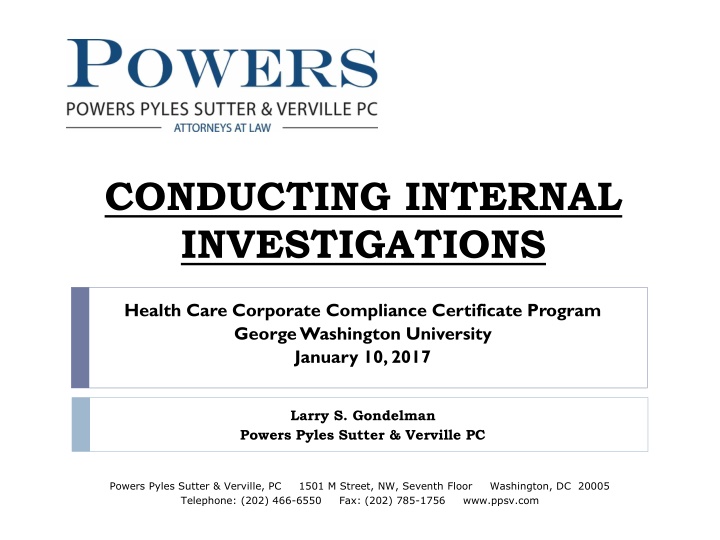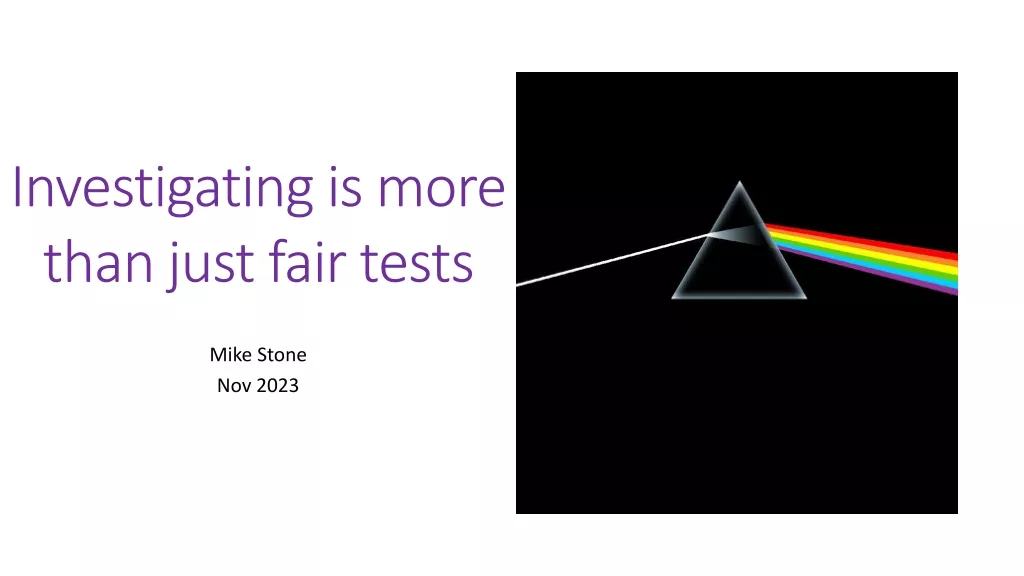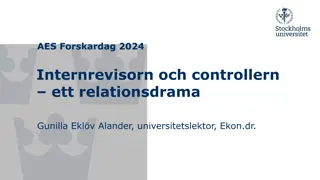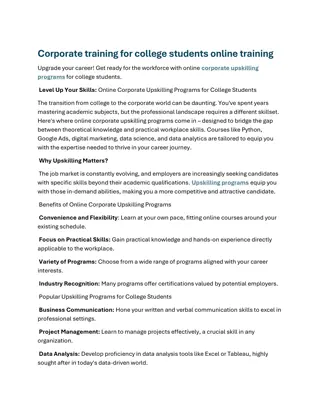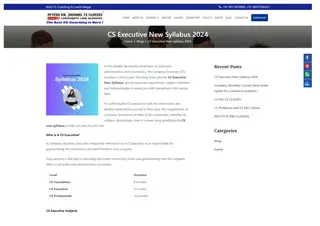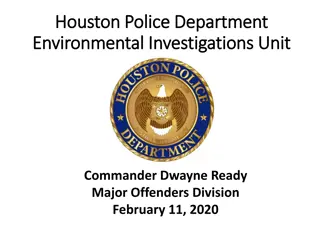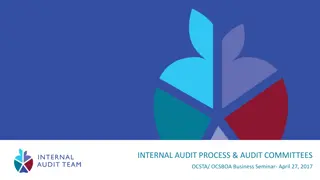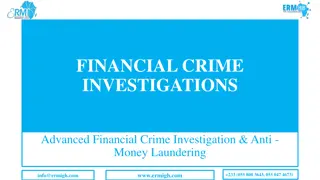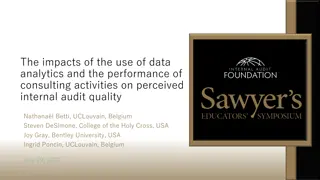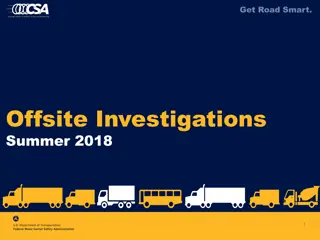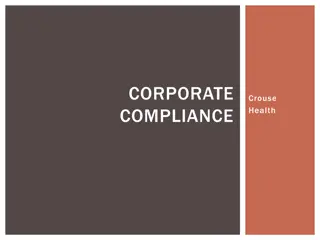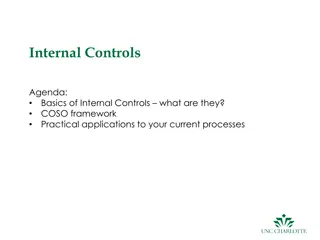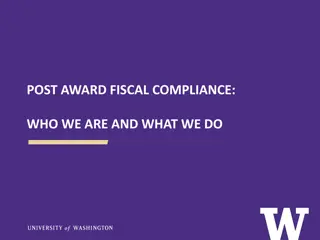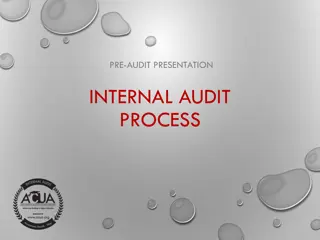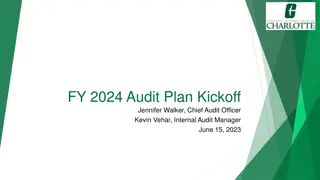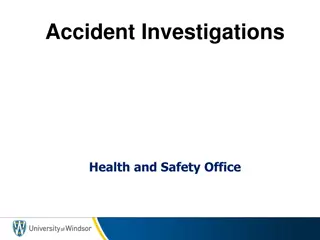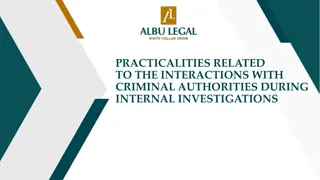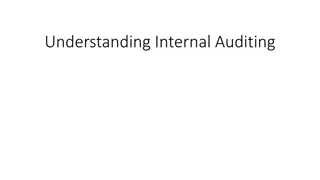Internal Investigations in Corporate Compliance
An internal investigation in corporate compliance involves probing suspected misconduct within an organization. It is a crucial element of compliance programs, aimed at uncovering facts, halting violations, implementing remedies, and considering disciplinary actions or self-disclosure to authorities. Various factors such as ongoing government investigations, whistleblower allegations, and legal considerations influence the need for and conduct of internal investigations.
Download Presentation

Please find below an Image/Link to download the presentation.
The content on the website is provided AS IS for your information and personal use only. It may not be sold, licensed, or shared on other websites without obtaining consent from the author.If you encounter any issues during the download, it is possible that the publisher has removed the file from their server.
You are allowed to download the files provided on this website for personal or commercial use, subject to the condition that they are used lawfully. All files are the property of their respective owners.
The content on the website is provided AS IS for your information and personal use only. It may not be sold, licensed, or shared on other websites without obtaining consent from the author.
E N D
Presentation Transcript
CONDUCTING INTERNAL INVESTIGATIONS Health Care Corporate Compliance Certificate Program George Washington University January 10, 2017 Larry S. Gondelman Powers Pyles Sutter & Verville PC Powers Pyles Sutter & Verville, PC 1501 M Street, NW, Seventh Floor Washington, DC 20005 Telephone: (202) 466-6550 Fax: (202) 785-1756 www.ppsv.com
WHAT IS AN INTERNAL INVESTIGATION? Factual/legal investigation by an organization of suspected illegal activity or misconduct by officers or employees Critical component of any compliance program Nuanced component with many pitfalls and judgment calls 2
PURPOSE OF AN INTERNAL INVESTIGATION Uncover the facts, whatever they may be https://www.youtube.com/watch?v=PWSx0bBiNIs Stop any ongoing violations Remedies to prevent future violations Disciplinary actions Self-disclosure to government? 3
WHETHER AND WHO? WHETHER: Depends on Context Existing government investigation or civil case Internal allegations of wrongdoing 4
WHETHER AND WHO? Existing government investigation or civil case Receipt of subpoena/possible FCA case Time can be of the essence 5
WHETHER AND WHO? Internal (whistleblower) allegations One academic study in 2011 involving 83 experienced audit committee members found whistleblower reports received through anonymous channel were given less credibility and allocated fewer investigative resources than those from an identified source. 6
WHETHER AND WHO? A 2010 benchmarking report revealed that 50% of all whistleblower calls are anonymous. Under-investigating of all allegations could leave companies exposed. Who will management blame if a reported allegation does not get investigated? 7
WHETHER AND WHO? WHO? In-house Counsel versus Outside Counsel In either event, generally preferable to have an attorney conduct investigation to handle privilege and litigation issues 8
WHETHER AND WHO? In-house purely self-regulatory if no compelling need to involve an outside party to buttress appearance of objectivity key question is whether in-house counsel possesses necessary objectivity to conduct the investigation 9
WHETHER AND WHO? Outside Counsel prudent choice if any potential to garner interest from government enforcement agencies widespread activity high-level employees involved adverse publicity 10
WHETHER AND WHO? Regular outside counsel versus firm with no prior involvement with matters at issue. Adjunct Who Question Who is client? independent of management independent committee, e.g. audit special committee of independent directors 11
THE INVESTIGATION Define the Scope Investigative Team Fact Gathering Documents Interviews Review, assess, and report findings Corrective, remedial, and disciplinary actions (if necessary) 12
THE SCOPE Identify the issues May need to revisit as investigation unfolds Identify the documents Identify the witnesses 13
THE INVESTIGATIVE TEAM Establish lines of reporting and supervision Identify primary corporate contact for collecting documents, scheduling interviews Determine if consultants are required. 14
FACTSTHE DOCUMENTS Importance of documents Documents drive government and internal investigations Litigation Hold Preservation of documents/Document Hold Consider whether to put document hold in writing Review/Suspend document retention policy; retain everything until further notice Cease destruction of documents in normal course of document retention policy and practices Helps to ensure availability of documents for review Prevents potential obstruction of justice issues should the Government later audit, investigate or otherwise get involved 15
FACTSTHE DOCUMENTS Document Gathering Use of IT specialists for electronic retention and gathering of electronic documents Document Review 16
FACTSTHE WITNESSES Joint Representation Issues Usually, only represent entity, not officers or directors Counsel for Employees Not usually an issue if not in response to government investigation If so, issues of separate representation and indemnification 17
FACTSTHE WITNESSES Rules for Interviewing Individual in-person interviews, not groups Third person should always be present (note taker) Take notes, do not tape In general, don t discuss one witness s interview with another witness Prepare memo of interview as soon as practicable after interview not verbatim. 18
FACTSTHE WITNESSES Tell the witness the general reason for the interview, giving limited information only what is necessary Communicate ground rules, especially that the employee should not discuss the interview with anyone You can say you will try to keep the interview confidential, but you cannot guarantee; also may have to note that there are no secrets from management You can remind employee that refusal to cooperate with an internal investigation may lead to discipline 19
FACTSTHE WITNESSES My typical spiel: Who I am (a lawyer) don t hold it against me Who I represent, making it clear that company is client, not the individual Confidentiality of interview, but privilege of company, not employee, and it can be waived only by the company The reluctant witness example The lying witness example 20
PRIVILEGE ISSUES Typically, there is no privilege for routine compliance investigations and related materials However: The investigative process and findings may be protected from disclosure to third parties pursuant to attorney-client privilege where the investigation is directed by counsel in anticipation of potential litigation, or counsel is consulted and engaged for the purpose of providing legal advice on the subject being investigated 21
PRIVILEGE ISSUES Attorney Client Privilege Protects communications between attorney and client for purpose of obtaining legal advice Current employees, former employees, management Protects direct communications with in-house or outside legal counsel for legal (not business) advice Attorney can retain agents (accountants, experts, etc.) to assist Communications between agents and client, or between agent and attorney, can be covered by privilege, but must be at the direction of counsel for the ultimate purpose of providing legal advice 22
PRIVILEGE ISSUES Attorney-directed investigations or audits Can be privileged But again, fact gathering or audit results must be for purpose of providing legal advice To preserve the privilege, investigative steps should be undertaken by counsel or at the request of counsel When feasible, requests by counsel should be documented, e.g., interviews by non-lawyers The figurehead attorney is unlikely to be sufficient to preserve the privilege 23
PRIVILEGE ISSUES Documentation of attorney-client relationship Engagement Agreement or memo at start of investigation establishing attorney-client relationship Request from attorney for information, or written investigative plan Evidence that legal advice was delivered Identification of privileged documents Attorney-client privileged markings Avoid mystery documents 24
PRIVILEGE ISSUES Work-Product Doctrine protects an attorney s mental impressions, conclusions, opinions, and legal theories only applies to materials created in anticipation of litigation prospect of litigation must be identifiable investigations by regulatory agencies provide reasonable grounds for anticipating litigation 25
REPORT FINDINGS Written or oral report Written documentation: Summary of investigative actions and conclusions Basis for factual conclusions, evidence (documentary, testimonial), credibility of witnesses, and whether there is corroboration Keep in mind that report may someday be disclosed to government or other third parties during the course of litigation (if privilege does not shield its disclosure) Consider whether to report the findings and/or conclusions to complainants or government 26
